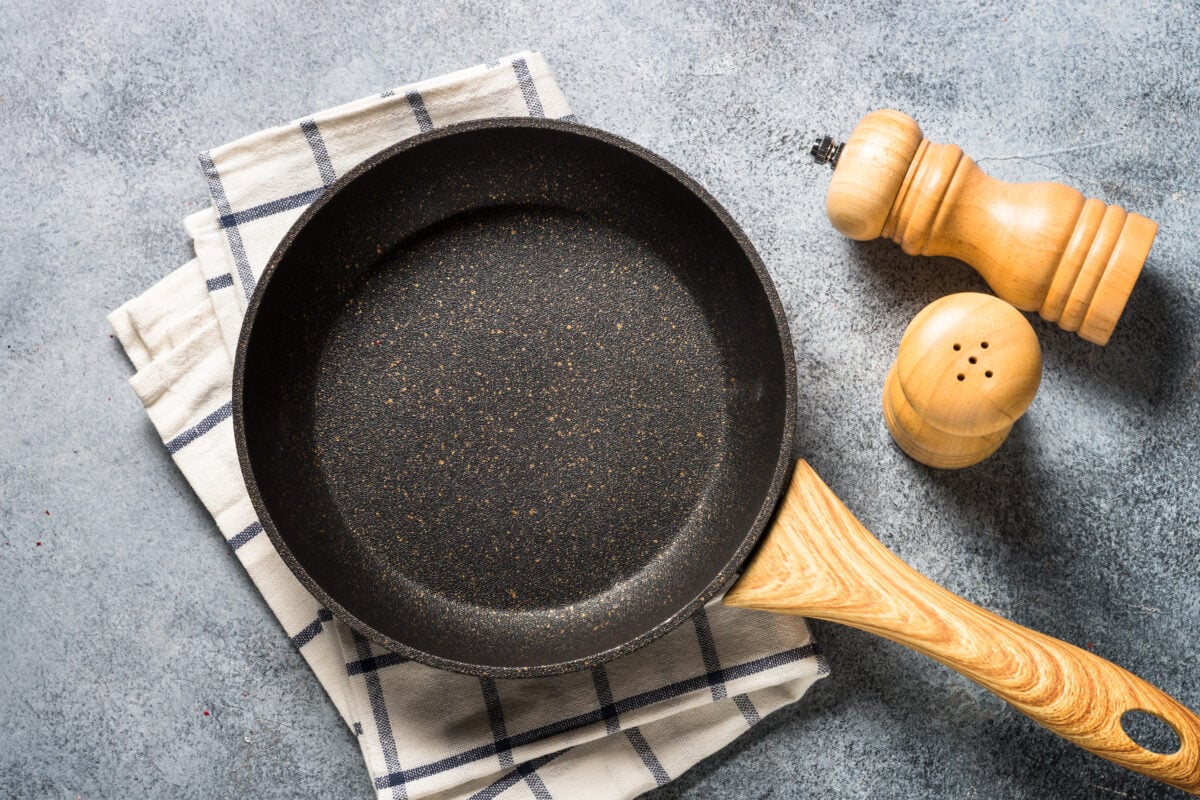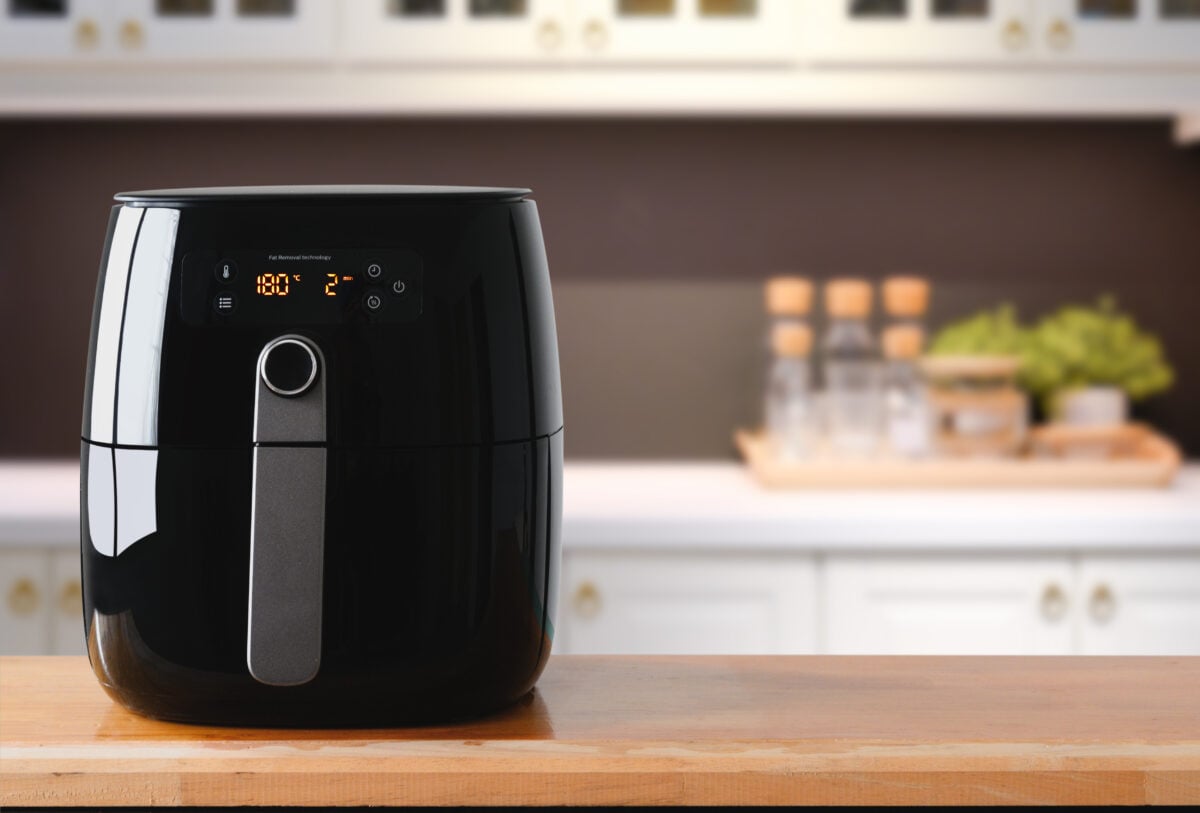Air fryers are more popular than ever. They are quick, convenient, and can achieve an even, crisp texture, all while using significantly less oil than some other forms of frying. But are air fryers safe to use? Plant Based News (PBN) spoke to two experts to find out more.
Read more: 81% Of USA Sandwich Bags Contain Toxic ‘Forever Chemicals’
Why are people worried about air fryers?
Air fryers are comparable to small, extremely efficient convection ovens. A heating element rapidly heats the air inside the cooking chamber, which is then circulated by a fan, making it extremely effective as well as energy efficient.
Around 60 percent of US households now own an air fryer, and the appliance’s popularity is growing throughout the UK and Europe as well. (Combination devices like Instant Pots are also popular, which also enable rapid, safe pressure cooking alongside frying.)
In some air fryers, the cooking chamber has a smooth, shiny, black surface to reduce the chance of cooking food sticking to it. But this non-stick coating – widely used on pans and other cookware for decades – is worrying some consumers.
Forever chemicals, or Perfluoroalkyl and Polyfluoroalkyl Substances (PFAS), are toxic, synthetic chemicals used in everything from waterproof clothing to firefighting foams. They are also an integral part of adding non-stick coatings to cookware, including some air fryers.
In recent weeks, in particular, social media users on TikTok and Instagram have queried whether non-stick coated air fryers are safe to use. Some appliances can almost reach 500° F, and some nonstick coatings are thought to decompose above this temperature.
What’s the problem with PFAS?

PFAS are often known as forever chemicals because of their notable longevity within the human body and the environment. Extensive exposure to PFAS has been definitively linked to serious health problems like liver damage, diseases, and cancer.
Assistant Professor Stephanie Eick of Emory University’s Rollins School of Public Health, told PBN that the ongoing buildup of PFAS in humans (known as bioaccumulation) can be considered a problem because of both its longevity and link to negative health outcomes.
“Scientists have seen now that exposure to PFAS is linked to diseases such as cancer, cardiovascular disease, obesity, as well as pregnancy outcomes such as preterm birth and fetal growth restriction,” explained Eick.
Forever chemicals have been widely used worldwide since around 1950, resulting in extensive water contamination, chronic health problems, and multiple lawsuits. However, this has overwhelmingly been through exposure to industrial pollution rather than cookware.
While there is a notable difference between the risks posed by intensive PFAS pollution at an industrial level and domestic use of products like non-stick pans within the home, the chemicals’ potential for harm still makes some consumers skeptical about safety.
Read more: Scientists Create ‘Vaccine’ To Protect Bees From Pesticides
PFAS’ toxicity does not necessarily make non-stick risky
Professor Oliver Jones of RMIT University, Melbourne, noted that PFAS is a catch-all term for a “wide group of chemicals many of which have quite different properties.” He explained that even the name “forever chemicals” can be considered a partial misnomer.
“PFAS are often termed forever chemicals because they are very resistant to degradation,” said Jones. “Unfortunately the term forever chemical is misleading as it implies that PFAS never break down and that if they get in your body they are there forever – neither of which is true. PFAS do break down (just very slowly) and they do not stay in your body forever.”
According to Jones, PFAS are linked with cookware primarily because Teflon – widely used in many non-stick pans and products – is a PFAS. However, Teflon (polytetrafluoroethylene, or PTFE) is non-toxic at the levels we are exposed to via cooking.
“Another concern related to the use of Teflon coating is that particles of PTFE may flake off from the cookware made with Teflon coating. This is very rare but even if this does happen Teflon is inert [not chemically reactive] and just passes through the body,” said Jones.
There is currently no evidence that PFAS non-stick coatings on cookware are linked with negative health outcomes. Furthermore, some of the chemicals used to produce non-stick items that are considered toxic have been filtered out of standard manufacturing.
So air fryers are safe to use?

When asked about the safety of cooking with non-stick appliances, Jones noted that almost nothing humans do in the modern world can be considered zero-risk. “Everything in our world has an associated level of risk. That risk might be low but it is not zero,” he said.
Jones explained that “air fryers are safe to use” in much the same way that non-stick pans are harmless; the risk of harmful exposure to PFAS via Teflon-coated cookware is more or less insignificant compared to the industrial environmental pollution and water contamination that has historically caused negative health outcomes.
Jones also said that he uses Teflon pans himself, despite studying PFAS as part of his job. “Discussion of toxicity is meaningless without dose,” he continued. “The question is thus not ‘is PFAS toxic’ but is it toxic at the levels that most of us are exposed to it at. The evidence would seem to indicate that it is not. So you can use your Teflon pans and not panic.”
“People tend to be quite bad at risk assessment,” continued Jones. “There is a huge amount of worry about unproven and very unlikely effects of PFAS for example yet nobody worries about things like excessive alcohol intake, lack of exercise, vaping, and sedentary lifestyles etc that have far more evidence of negative effects than PFAS.”
Jones added that he thinks it is “terrible” that we have polluted the world with PFAS, but that this doesn’t necessarily mean that having non-stick cookware is dangerous. “We need reasoned, evidence-based debate about the actual risks,” he said. “The world of toxicology is nuanced and all the evidence needs to be taken into account when assessing risks.”
Choosing alternatives to non-stick coated cookware
As noted by Jones, using non-stick cookware such as air fryers appears to represent minimal risk. But for folks who remain concerned about PFAS, there are an increasing number of options for avoiding them entirely or minimizing risk at home. And because PFAS degrade so slowly, many people may choose to avoid non-stick products for environmental reasons.
Eick recommends that people choose cast iron or stainless steel pans over those that are treated with PFAS, but noted that switching can potentially be expensive and unnecessary. As with any cookware, using wooden and plastic utensils for stirring will help preserve the integrity of the non-stick coating in air fryers and pans alike.
“I think as long as your non-stick pans treated with PFAS do not have scratches on them (or any other sort of defects that could cause parts of the pan to be flaking off), I think it’s reasonable to use them and it can be fairly safe,” said Eick. “It’s nearly impossible to avoid PFAS in everything so it’s really just about reducing your risk when you can.”
She also suggested looking for products that are labeled “PFAS free,” to include all PFAS chemicals rather than just specific ones. The same applies to air fryers, and Jones noted that some brands are already moving away from PFAS due to public concern.
However, he is quick to add that you should look into what chemical has been used instead, and question if it has been assessed for safety as thoroughly as PTFE has been. Even ceramic coatings are known to degrade over time, so while they are frequently marketed as a non-toxic option, their exact formulations are often unpublished.
Read more: Switzerland Canton Blocks Sale Of Meat Contaminated By Toxic PFAS Chemicals






